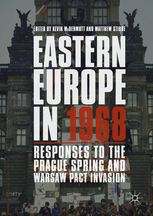Eastern Europe in 1968: responses to the Prague Spring and Warsaw Pact Invasion
A new collection of thirteen essays has been published. It analyses the situation and the reactions in Eastern Europe following the Prague Spring and the invasion of Czechoslovakia, in 1968, by the Warsaw Pact troops. The countries taken into account are those of the former Soviet Union and some particular countries such as Ukraine, Moldova and the Baltic countries. Two essays are entirely dedicated to Czechoslovakia and at least one for every single one of the following countries: Eastern Germany, Poland, Hungary, Bulgaria, Romania, Yugoslavia and Albania. The collection explains why many communist regimes opposed the reforms of Alexander Dubček and supported the military intervention under the Soviet leadership in 1968, while other remained distant. Furthermore, social reactions to the events of 1968 are analyzed, including the popular opposition against the repression of the Prague Spring, expressions of loyalty to the Soviet socialism or cases of indifference and uncertainty. Among the many and complex inheritances of 1968 there would have been the development of new ways of perceiving regional identity, borders, the destalinization and the heavy weight of the past.
McDermot K. And Stibbe M.,
Eastern Europe in 1968: responses to the Prague Spring and Warsaw Pact Invasion,
Editor Palgrave Macmillan: London 2018,
311 p.





